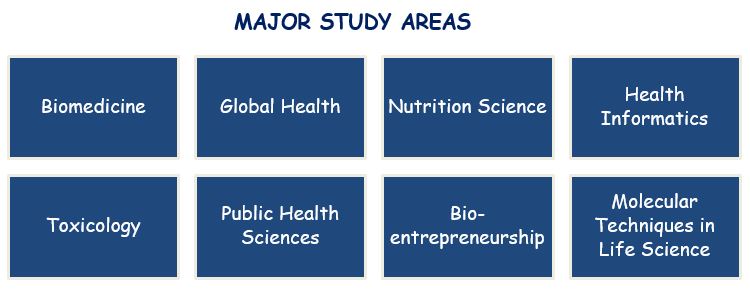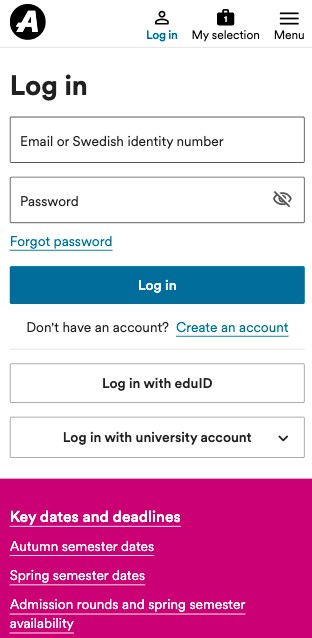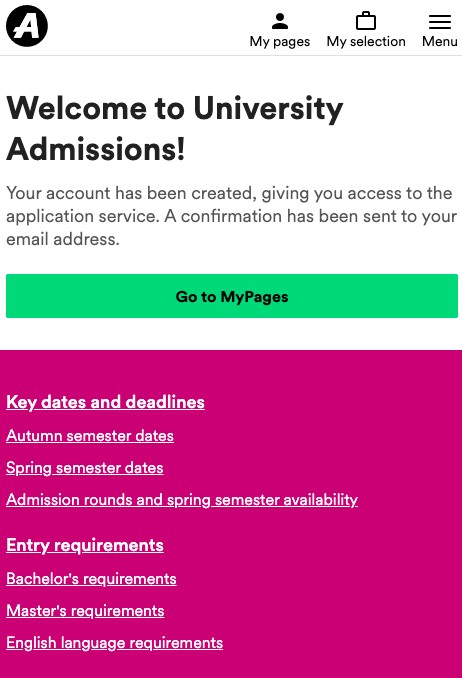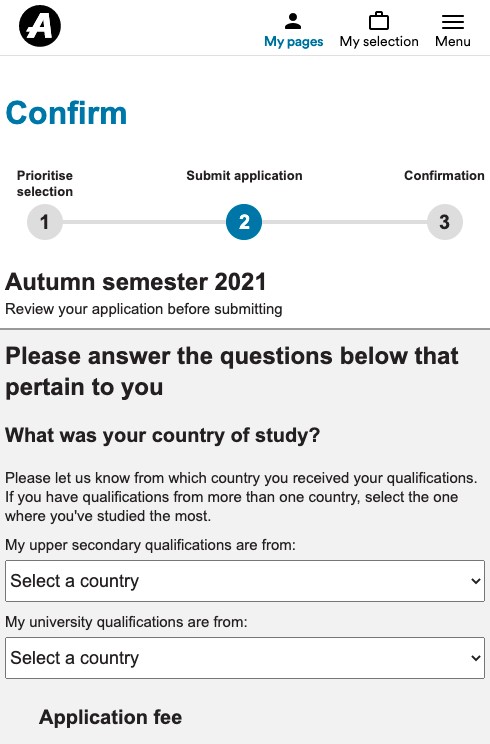

Karolinska Institutet Admissions 2025: Application Deadline, Requirements & Costs
1 Campus
- Estd. 1810
KI AdmissionsWhat’s new?
Karolinska Institutet (KI) is a research-led medical university located in Solna, Sweden. Founded in 1810 to train skilled army surgeons, the university’s vision is to advance knowledge about life and strive towards better health for all. It has state-of-the-art infrastructure and an excellent environment suitable for sustaining high-quality research and education. The university offers various programmes in Medicine and Healthcare to enhance inter-professional education and training.
The university also has several international collaborations to fulfil the mission of providing better health for all. The collaborations occur at three different levels, through individual scientists, departments with the same units, and strategic alliances with international universities. The Cooperation programmes include Erasmus+, Erasmus+ exchange mobility, Linnaeus-Palme programme, and Nordplus. The university also has several Nobel Prize winners, such as Hugo Theorell, KI's first Nobel Laureate, who received the Nobel Prize in Physiology. After him, Ragnar Granit also received the Nobel in Physiology. Other Nobel Prize winners from KI include Torsten Wiesel, Sune Bergström, and more.
Courses Offered
What all courses are available to international students?
Karolinska Institutet offers several undergraduate, postgraduate, research, and foundation programmes to its students through its 22 academic departments. It offers only one undergraduate course in English – Bachelor's Programme in Biomedicine. All other undergraduate programmes, including the medical programme and the dentistry programme, are taught in Swedish.
Eligibility & Documents Required
What are the eligibility requirements?
The eligibility criteria and English language requirements for undergraduate and postgraduate students are as follows:
Undergraduate Admissions
For the Biomedicine programme, applicants must have a high school certificate or Grade 12 diploma with the following mandatory study courses in high schoolequivalent to the Swedish upper secondary level courses:
- Mathematics: 4 credits
- Biology: 2 credits
- Chemistry: 2 credits
- Social Sciences
- Modern languages
For Indian applicants, the university accepts the following educational certificates for admission:
- Higher Secondary School Certificate
- Intermediate Examination Certificate
- All Indian Senior School Certificate Examination
- Pre-University Education Certificate
- Indian School Certificate
- Certificate of Vocational Education
- Polytechnic Diploma Certificate
Additionally, international applicants need to meet the English proficiency requirements as well. Any one of these exam score will be accepted:
| English Language Tests Accepted |
Minimum Score Required |
|---|---|
| 6.5 bands or above, with a minimum of 5.5 in all areas. |
|
| PBT: 575, with a score of 4.5 (Scale 1-6) in the written test iBT: 90 overall, with a score of 20 (Scale 0-30) in the written test |
|
| A score of 62 with 61 in writing |
|
| C1 Advanced: 180 overall |
Postgraduate Admissions
The entry requirements for masters-level studies are as follows:
- Students must have a four-year bachelor’s degree or diploma
- For some programmes like Social Sciences and Humanity, a three-year bachelor’s degree might be considered
- Students with a three-year bachelor’s degree without honors will not be considered for master’s admissions
- To enter a specific programme, students must have a specific bachelor's degree in the same field
- Any one of these English language exam scores is required:
| English Language Tests Accepted |
Minimum Score Required |
|---|---|
| IELTS |
7.0 bands or above, with a minimum of 6.0 in all areas |
| TOEFL |
PBT: 600, with a score of 4.5 (Scale 1-6) in the written test iBT: 100 overall, with a score of 20 (Scale 0-30) in the written test |
| PTE |
A score of 68 with 61 in writing |
| Cambridge |
C2 Proficiency, with a minimum score of 200 |
What all documents are needed for application?
All international applicants need to submit the official academic transcripts and English proficiency proofs along with the following supporting documents:
- School or college-issued mark sheets or result cards
- References (LORs)
- Personal Statement or Essay
- Statement of Purpose (SOP)
- Resume
- A copy of the passport
- Photographs
- Birth certificate
- Portfolio, research sample, or other course-specific documents
- Financial documents
Application & Tuition Fees
Is there any application fees?
The application fee for both undergraduate and postgraduate programmes SEK 900 (Swedish Kronar), non-refundable. Students can apply for several courses within a single application.
What is the fee structure of courses offered by the university?
The tuition fee is to be paid in instalments prior to the start of each semester. Instalments are due in June for the autumn semester and in December for the spring semester. International applicants can expect tuition to be around the following ranges:
| Programmes |
Annual Tuition (in SEK) |
Tuition/Installment (in SEK) |
|---|---|---|
| Bio-entrepreneurship |
180,000 |
90,000 for 4 installments |
| Masters in Biomedicine |
200,000 |
100,000 for 4 installments |
| Bachelors in Biomedicine |
180,000 |
90,000 for 6 installments |
| Global Health |
180,000 |
90,000 for 2 installments |
| Health Informatics |
165,000 |
85,000 for 4 installments |
| Nutrition Science |
200,000 |
100,000 for 2 installments |
| Public Health Sciences - Epidemiology |
180,000 |
90,000 for 4 installments |
| Public Health Sciences - Health Promotion and Prevention |
180,000 |
90,000 for 4 installments |
| Health Economics, Policy and Management |
180,000 |
90,000 for 4 installments |
| Toxicology |
200,000 |
100,000 for 4 installments |
| Molecular Techniques in Life Science |
200,000 |
100,000 for 4 installments |
Source: Karolinska Institutet
Fee varies depending on the course and progressive years. We encourage you to check the university’s website for the exact fee.
Scholarships & Financial Aid
Is there any scholarship or financial aid available for international students?
Karolinska Institutet offers various scholarships to international students based on a student’s merit, academic excellence, and financial needs. Some of these scholarships help cover the tuition fees, living expenses, and other expenses of students.
The Karolinska Institutet Global Master’s Scholarships
It is offered to students with good academic background who are enrolled in one of the Global Master’s Programme offered in the autumn semester. About 1,500 international students can benefit from this award each year. Interested applicants need to submit their scholarships applications by mid-January.
Swedish Institute’s Scholarship
An amount of SEK 10,000 is awarded to international students to help cover living expenses and tuition fees per month. It is available for students enrolled in a master’s programme and the scholarships deadline is mid-February.
Apart from these, other scholarships offered to international students are:
- EU Scholarship
- Rotary Scholarships
- Graduate Scholarships
- Engineering Scholarships
- Study Abroad Scholarships
For more details on each scholarship, students are advised to visit the scholarship webpage on the university website.
Admission Process
When do the admissions start?
The university has two intake sessions, Spring and Autumn.For bachelor's and master’s studies starting in autumn, there two separate round of admissions:
| Rounds |
Application Begins |
Application Closes |
|---|---|---|
| First |
Mid-October |
Mid-January |
| Second |
Mid-March |
Mid-April |
For spring admissions, the following deadlines are applicable for UG and PG applicants:
| Rounds |
Application Begins |
Application Closes |
|---|---|---|
| First |
June |
Mid-August |
| Second |
Mid-September |
Mid-October |
Applicants who need to apply for a visa to study in Sweden must apply before the January or August deadlines. The second round of admissions are generally not open for international applicants.
Deadlines vary depending on the course and can change frequently. We encourage you to check the university’s website for exact deadlines.
What is the UG and PG application process?
International applicants need to apply via the Swedish national application website: universityadmissions.se.
Step 1: Create an account as a new user.
Step 2: After setting your account, search for courses and programmes and then rank your selections.
Step 3: After you have submitted your electronic application, you must document your previous studies.
After filling all the information, review and submit the application by paying the application fee.
When will I hear from the university after I submit my application?
There is no specific duration within which students will hear from the university. The applications are processed individually, and it takes considerable time to assess them. Students will hear from the university as soon as the application is processed and accepted/rejected by the university. However, students can check the application status on the admission portal.
Student Diversity & Preferred Profile
What are the chances to get into this university?
Karolinska Institutet is one of the most competitive universities in Sweden with an admission rate of 3.9% only. Thus, it is highly selective. The selection process is divided between the Karolinska Institutet and University Admissions in Sweden. Both play very different roles and process the applications individually. The University Admissions check the documents, fee status, and the proof of exemption of the applications. If students meet all the eligibility criteria and English language requirements, the application is processed further.
After the University Admissions team processes the applications, Karolinska Institutet assesses other entry requirements for specific programmes. Once all the requirements are met, the merit rating is checked for both general and specific programmes. CV/resume, statement of intent, and recommendation letters also help identify the best candidates for admission. Students will receive a notification once the applications are approved. It can be said that meeting the minimum requirements is not enough for selection. Students must have exceptional scores and a genuine interest in being part of the university.
How many Indian/international students are studying at the university?
Karolinska Institutet has over 6,500 students studying at the institute, including 2,000 doctoral students. The percentage of women students is 73% compared to 27% of male students. Over 1,980 international students are studying bachelor's and master's programmes at this university.
Part Time Work While Studying
Can I work while studying here?
International students are allowed to work on and off-campus while studying. The institute offers various job opportunities to the students to help them enhance their skills and knowledge. Students can find jobs on the Career Support webpage of the university. The hour limit to work while studying is 20 hours during a regular semester. However, during vacations, students can work for a maximum of 40 hours.
The Erasmus + Traineeship Programme allows students to work on degree projects and at research centres and other organisations to gain work experience. It helps enrich both studies and the professional life of a student. Students can also opt for internships at the university or work part-time in laboratories. The wages vary on the level of the job and the department. The jobs available at the university include positions such as a doctoral student in autoimmunity, programmers, research specialists, and research assistants.
Campuses & Accommodation
How many colleges and campuses does the university have?
Karolinska Institutet has two campuses in Stockholm – KI Campus Solna (main campus) and KI Campus Flemingsberg. KI consists of a number of university-wide positions, units and bodies that support the management and the organisation on various issues. This includes its 22 departments and Comparative Medicine, Teaching and learning, University Library and University Administration.
Is on-campus housing available?
The institute offers furnished apartments and rooms to international students in several areas of Stockholm. KI does not own housing space in these areas, but the contracts are signed between the students and KI housing for the period of accommodation. The accommodation areas include Berzelius väg, Jägargatan, KI Residence Flemingsberg, KI Residence Solna, Pax, and Strix. The facilities include furniture, bed linen, internet, TV, cable, desks, chairs, and more.
| Accommodation |
Monthly Rent (in SEK) |
|---|---|
| Berzelius väg |
10,230 |
| Jägargatan |
3,100 |
| KI Residence Flemingsberg |
4,588 |
| KI Residence Solna |
5,850 |
| Pax |
4,030 |
| Strix |
3,999 |
Students can also choose to rent a private accommodation or off-campus housing with their friends or family as per their needs and preferences. Students can find various off-campus and private housing listings on the university's website.
Living Expenses
International applicants can expect their monthly living expense to be within the following estimates depending on their lifestyles:
| Expenses Type |
Monthly Rates (in SEK) |
|---|---|
| Food |
2,700 |
| Accommodation |
3,500-7,000 |
| Student Union Fee, and books |
200 |
| Local travel |
850 |
| Clothing, insurance, phone, insurance, etc. |
1,850 |
University Contact Information
Whom should I contact in case of any doubts?
In case of doubts or queries, students can contact the university at:
Address: Karolinska Institutet, Solnaväen 1, 17177 Stockholm, Sweden
Telephone: +46-8-524-800-00
Website: ki.se/en
KI
Student Forum
About the author
 Karolinska Institutet picture
Karolinska Institutet picture Karolinska Institutet picture
Karolinska Institutet picture Karolinska Institutet picture
Karolinska Institutet picture

KIContact Information
"Karolinska Institutet
SE-171 77 Stockholm"
Stockholm ( Other - Sweden)











